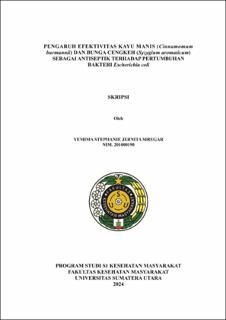| dc.description.abstract | Unclean hands can transfer Escherichia coli from the body, feces, or other sources
to food which when consumed can cause diarrhea. The use of natural ingredients
as antiseptics is one solution to maintain hand hygiene. The purpose of this study
was to determine the influence of the effectiveness of cinnamon (cinnamomum
burmannii) and clove (syzygium aromaticum) as antiseptics on the growth of
escherichia coli bacteria. This study is a quantitative study with a true experimental
method with a post-test only control design. Testing the inhibition of Escherichia
coli in antiseptic extracts of cinnamon and clove using the Kirby-Bauer test with 3
repetitions. The extracts used were obtained from the maceration process and made
into several concentrations, namely 20%, 40%, 60%, 80%, and 100%. The positive
controls used were Chloramphenicol Palmitate antibiotics and 70% alcohol
antiseptic. The negative control in this study was aquadest. The measurement
results after 24 hours showed that cinnamon and clove extracts at concentrations
of 20%, 40%, 60%, 80%, and 100% respectively effectively inhibited the growth of
Escherichia coli because there were clear zones of 10,067 mm, 10,867 mm, 11,267
mm, 12,833 mm, and 13,4 mm. Data analysis using the Kruskal-wallis test showed
p-value was 0,026 (p < 0,05). This means there is a difference in the average
diameter of the bacterial inhibition zone. Through the Post Hoc Multiple
Comparison test, it was found that 100% concentration with 70% alcohol antiseptic
had a significant difference because it had a p-value = 0,036 (p < 0,05). However,
concentrations of 20% to 80% showed no significant difference with 70% alcohol
antiseptic, because the p-value showed p > 0,05. Therefore, cinnamon and clove
antiseptic from 20% to 100% concentration can be a substitute for 70% antiseptic
alcohol. Future research can test cinnamon and clove antiseptics on other bacteria | en_US |


